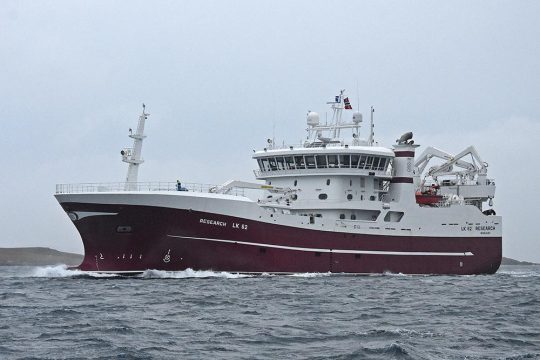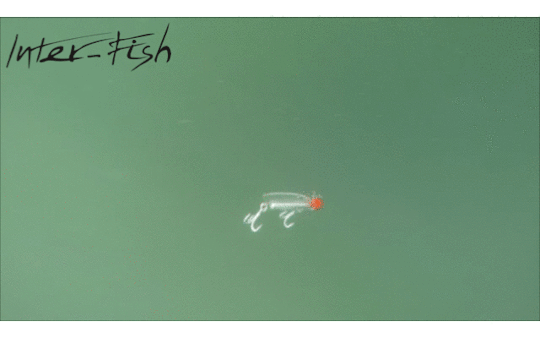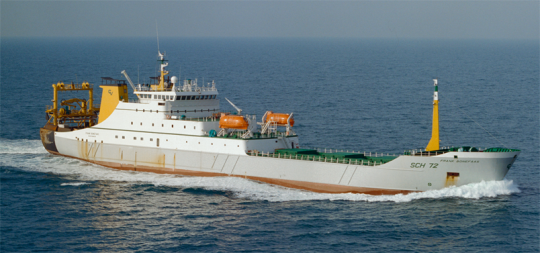#Interfish
Explore tagged Tumblr posts
Text
Storbritanniens största fiskebåtar 2022
Storbritanniens största fiskebåtar 2022
De största fiskebåtarna i Storbritannien är i huvudsak pelagiska fiskebåtar som är hemmahörande i Fraserburgh, Peterhead och på Shetlandsöarna. De sistnämnda kan ha Lerwick eller nån hamn på ön Whalsay som exempelvis Symbister som hemmahamn. Den allra största båten är dock en demersal fiskebåt, H 72 Frank Bonefaas. Den enda övriga stora demersala fiskebåten är H 7 Kirkella. De flesta stora…

View On WordPress
#Andrew Marr International#BF 60 Artemis#Cornelis Vrolijk#FR 77 Ocean Star#Fraserburgh#H 7 Kirkella#H 72 Frank Bonefaas#Interfish#Klondyke Fishing Co Ltd#Lerwick#LK 297 Serene#LK 362 Charisma#LK 491 Antares#LK 62 Research#Londonderry#Mewstead (Fraserburgh) LLP#N 905 Voyager#North Atlantic Fishing Co Ltd#PD 65 Lunar Bow#Peterhead#Serene Fishing Co Ltd#UK Fisheries#Voyager Fishing Co Ltd#Whalsay
0 notes
Video
instagram
ตอนเด็กๆเคยเลี้ยงแล้วคิดว่าทำไมมันไม่มีหลายสีในตัวเดียวนะ ตอนนี้ความฝันวันเด็กเป็นจริงแล้ว #ปลากัด #ปลากัดไทย #siamesefightingfish #siamesefighter #siamesefighterfish #interfish #interfishthailand (at Interfish Thailand Shop) https://www.instagram.com/p/Bugor66lhGw/?utm_source=ig_tumblr_share&igshid=bgbl4u0qmxlk
0 notes
Text


【網路活體競標BAND : MR.BETTA 鬥魚先生】
魚隻已經上架囉! *高清影片請從BAND觀看
這邊詢問購買一律為店面價(直購價)喔!
欲競標者請至BAND群競標🥰
競標下標處:
https://band.us/@sbptw
歡迎來工作室看喜歡再下標/直購喔!
台北工作室(預約制,請提前至少兩小時預約)
地址:台北市大同區延平北路三段61巷9號1樓
歡迎追蹤我們 ♥️♥️ IG: mr.betta.tw / IG: sbp.tw
1 note
·
View note
Text







Meet
Lord Voldemort.
🐉
Lord Voldemort is a true...
Black Platinum Dragon Full Mask Feathertail [FT] Male
PS.
Dragonscale is a marketing term for Petco or Petsmart. Same concept for Dumbo, Paradise, Bumblebee, Opal, and more. Dragon is the preferred term for the standards. Dragon and Samurai are created by Interfish in Thailand. Warrior is created by Aquastar71 in Thailand, and Mamba is created by Yang Plakad in Thailand.
—> www.instagram.com/gleebettas
#gleebettas#bettawhatchalookinat#betta community#fish community#betta splendens#betta fish#bettasofinstagram#artists on tumblr
2 notes
·
View notes
Photo

#InterFish #InterVibe40 #InterVibeAction The Inter-Vibe action top view trolled at approximately 3.5km/ph. Its a must have in the tackle box, with 3 tow points it can be trolled, jigged, retrieved and hopped. When vertically jigged it will propel forward on the lift covering quite a lot of ground making it a perfect option for ice jigging or jigging amongst suspended fish.
0 notes
Link
0 notes
Text
Storbritanniens största pelagiska fiskeriföretag
Storbritanniens största pelagiska fiskeriföretag
De flesta stora pelagiska fiskeriföretag i Storbritannien finns i Skottland och på Shetlandsöarna. De är i de flesta fall familjeföretag. Men även några riktigt stora internationella fiskerikoncerner har också verksamhet i Storbritannien. Det gäller exempelvis nederländska Cornelis Vrolijk och brittiska Andrew Marr International Ltd. Det två företagen är iofs också familjeägda. I en del brittiska…

View On WordPress
#Altaire Fishing#Andrew Marr International#Antares Fishing#Interfish#Klondyke Fishing#Lunar Fishing#Mewstead LLP#Research Fishing#Serene Fishing#Voyager Fishing
0 notes
Text
Storbritanniens största fiskebåtar 2020

De flesta stora fiskebåtar i Storbritannien hör hemma i Skottland inklusive Shetland och är pelagiska trålare. De ägs av lokala familjer som ofta varit yrkesfiskare i generationer. Ägarna är ofta aktiva fiskare ombord.
Flera av de allra största båtarna på listan ägs av utländska jätteföretag som Samherji, Parlevliet & van der Plas (PP Group) och Cornelis Vrolijk. UK Fisheries ägs av Samherji och…
View On WordPress
#Altaire Fishing Co Ltd#Antares Fishing Co Ltd#Banff#Charisma Fishing Co Ltd#Cornelis Vrolijk#FR 77 Ocean Star#Fraserburgh#H 7 Kirkella#H 72 Frank Bonefaas#Hull#Interfish#Lerwick#LK 297 Serene#LK 362 Charisma#LK 394 Zephyr#LK 419 Antares#LK 429 Altaire#LK 62 Research#Lunar Group#Mewstead LLP#N 905 Voyager#Newry#North Atlantic Fishing Co Ltd#PD 165 Pathway#PD 265 Lunar Bow#Peterhead#PP Group#Research Fishing Co Ltd#Samherji#Serene Fishing Co Ltd
0 notes
Text
Storbritanniens största fiskebåtar 2019
Storbritanniens största fiskebåtar 2019

De flesta stora fiskebåtar i Storbritannien hör hemma i Skottland inklusive Shetland. De ägs av lokala familjer som ofta varit yrkesfiskare i generationer. Ägarna är ofta aktiva fiskare ombord. Men de allra största hör hemma i England och Nordirland (N 905 Voyager).
Flera av de allra största båtarna på listan ägs dock av utländska jätteföretag som Samherji, Parlevliet & van der Plas (PP…
View On WordPress
#Antares Fishing#Cornelis Vrolijk#FR 224 Christina S#FR 227 Chris Andra#Freedom Fish#H 110 Norma Mary#H 171 Cornelis Vrolijk#H 7 Kirkella#Interfish#Klondyke Fishing#LK 419 Antares#LK 429 Altaire#Lunar Group#Parlevliet & van der Plas#PD 165 Pathway#PD 365 Kings Cross#Shannon Fishing
0 notes
Text
Storbritanniens största fiskeriföretag 2022
Storbritanniens största fiskeriföretag 2022
I det brittiska fisket är det vanligt att fiskhandelsföretag äger andelar i många olika fiskeriföretag och fiskebåtar. Det är vanligt att fiskebåtar kan ha flera delägare, både bolag och privatpersoner. De kan också ha managementavtal för många fiskebåtar, även en del som de inte är delägare i. Dessutom kan de ha avtal om att sälja olika fiskebåtars fångst. Det kan då handla om både såna de är…

View On WordPress
#Altaire Fishing Co Ltd#Andrew Marr International#Ekonomi#Fiskerättigheter#Fws Carter & Sons Ltd#Interfish Ltd#J & J Denholm Ltd#Klondyke Fishing Co Ltd#L.H.D Limited#Lunar Fishing Co Ltd#North Atlantic Fishing Co Ltd#Ocean Holdings South West Ltd#Serene Fishing Co Ltd#UK Fisheries Ltd
0 notes